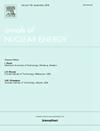Utilization of NEUP Data for HTGR Thermal-Fluid Code Validation: A New Resource Platform
IF 2.3
3区 工程技术
Q1 NUCLEAR SCIENCE & TECHNOLOGY
引用次数: 0
Abstract
The high-temperature gas-cooled reactor (HTGR) is a Generation-IV advanced nuclear reactor design that has received significant attention due to its ability to generate high-temperature heat ranging from 750-950 °C. HTGR designs feature tri-structural isotropic (TRISO) fuel coated with ceramics, including carbon and silicon carbide, which allows for high-temperature operation while maintaining structural and fission product barrier integrity. Since its inception in 2009, the U.S. Department of Energy (DOE) Office of Nuclear Energy’s Nuclear Energy University Program (NEUP) invested more than $500 million in U.S. university nuclear research, specifically concentrating on advancing advanced reactor technologies, materials, and fuel cycles. By fiscal year 2024, the NEUP funded 36 projects dedicated to HTGR thermal-fluid (TF)1 research at 13 universities, each contributing significantly to our understanding of this technology. The outcomes of these diverse projects have been disseminated through dissertations and theses, final NEUP reports, peer-reviewed journal articles, and presentations at academic conferences, forming a comprehensive tapestry of knowledge. Despite the substantial value of these projects, their public domain dissemination has been fragmented, posing challenges for accessibility to researchers and policymakers and leading to underutilization of DOE investments. Recognizing this critical gap and its potential value for the future of nuclear research, the DOE’s Advanced Reactor Technologies (ART) Gas-Cooled Reactor (GCR) program has been conducting an extensive survey of completed and ongoing HTGR NEUP projects. This survey enabled the compilation of crucial data, resulting in the development of a new public-access data resource tailored for computational fluid dynamics and system code verification and validation (V&V), specifically designed for HTGR TF applications.
Additionally, the data collection process during the survey process has revealed a significant challenge in central data organization, due to individual researchers from different institutes employing varying standards and preferences for recording and documenting experimental data. Therefore, an urgent need has been identified to establish a standardized reporting format for HTGR experimental projects. Addressing this issue is essential for enhancing collaboration, maximizing the impact of DOE investments, and ensuring the advancement of HTGR research and development (R&D).
利用NEUP数据进行高温高温堆热流体代码验证:一个新的资源平台
高温气冷堆(HTGR)是第四代先进的核反应堆设计,由于其能够产生750-950°C的高温热量而受到了极大的关注。HTGR设计采用三结构各向同性(TRISO)燃料涂层陶瓷,包括碳和碳化硅,允许高温操作,同时保持结构和裂变产物屏障的完整性。自2009年启动以来,美国能源部(DOE)核能办公室的核能大学项目(NEUP)向美国大学的核研究投资了5亿多美元,特别侧重于推进先进的反应堆技术、材料和燃料循环。到2024财年,NEUP资助了13所大学的36个HTGR热流体(TF)1研究项目,每个项目都对我们对这项技术的理解做出了重大贡献。这些不同项目的成果通过论文和论文、NEUP最终报告、同行评议的期刊文章和学术会议上的演讲传播,形成了一个全面的知识挂毯。尽管这些项目具有巨大的价值,但它们在公共领域的传播是分散的,这给研究人员和政策制定者的可及性带来了挑战,并导致美国能源部投资的利用不足。认识到这一重大差距及其对未来核研究的潜在价值,美国能源部的先进反应堆技术(ART)气冷堆(GCR)项目一直在对已完成和正在进行的HTGR NEUP项目进行广泛调查。该调查使关键数据得以汇编,从而开发了专门为HTGR TF应用量身定制的新的公共访问数据资源,用于计算流体动力学和系统代码验证和验证(V&;V)。此外,调查过程中的数据收集过程显示了中央数据组织的重大挑战,因为来自不同研究所的个体研究人员采用不同的标准和偏好来记录和记录实验数据。因此,迫切需要为高温高温堆实验项目建立一种标准化的报告格式。解决这一问题对于加强合作、最大化能源部投资的影响以及确保HTGR研究和开发的进展至关重要。
本文章由计算机程序翻译,如有差异,请以英文原文为准。
求助全文
约1分钟内获得全文
求助全文
来源期刊

Annals of Nuclear Energy
工程技术-核科学技术
CiteScore
4.30
自引率
21.10%
发文量
632
审稿时长
7.3 months
期刊介绍:
Annals of Nuclear Energy provides an international medium for the communication of original research, ideas and developments in all areas of the field of nuclear energy science and technology. Its scope embraces nuclear fuel reserves, fuel cycles and cost, materials, processing, system and component technology (fission only), design and optimization, direct conversion of nuclear energy sources, environmental control, reactor physics, heat transfer and fluid dynamics, structural analysis, fuel management, future developments, nuclear fuel and safety, nuclear aerosol, neutron physics, computer technology (both software and hardware), risk assessment, radioactive waste disposal and reactor thermal hydraulics. Papers submitted to Annals need to demonstrate a clear link to nuclear power generation/nuclear engineering. Papers which deal with pure nuclear physics, pure health physics, imaging, or attenuation and shielding properties of concretes and various geological materials are not within the scope of the journal. Also, papers that deal with policy or economics are not within the scope of the journal.
 求助内容:
求助内容: 应助结果提醒方式:
应助结果提醒方式:


